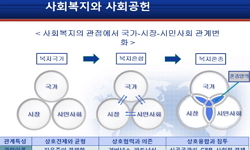Social enterprise is regarded as an alternative to today`s economic policies representing “economic growth without employment”. It provides jobs and social services for the poor to help them out of poverty. The point of contact between social ente...
http://chineseinput.net/에서 pinyin(병음)방식으로 중국어를 변환할 수 있습니다.
변환된 중국어를 복사하여 사용하시면 됩니다.
- 中文 을 입력하시려면 zhongwen을 입력하시고 space를누르시면됩니다.
- 北京 을 입력하시려면 beijing을 입력하시고 space를 누르시면 됩니다.
https://www.riss.kr/link?id=A100859592
- 저자
- 발행기관
- 학술지명
- 권호사항
-
발행연도
2013
-
작성언어
Korean
- 주제어
-
등재정보
KCI등재
-
자료형태
학술저널
- 발행기관 URL
-
수록면
165-188(24쪽)
- 제공처
-
0
상세조회 -
0
다운로드
부가정보
다국어 초록 (Multilingual Abstract)
Social enterprise is regarded as an alternative to today`s economic policies representing “economic growth without employment”. It provides jobs and social services for the poor to help them out of poverty. The point of contact between social enterprise and Christianity is to serve the poor and seek social values. This paper investigates how the Korean churches should deal with social enterprise, looking into the ideas and practices of the two famous Christian social enterprises, the “Yolmaenanum jaedan” (the fruit-sharing foundation) and the “Nasom gongdongche” (the sharingserving community). The “Yolmaenanum jaedan” helping the North Korean defectors successfully operates five social enterprises and supports around 120 social entrepreneurs by granting microcredit loans. The “Nasom gongdongche” helping immigrant workers and their families operates three social enterprises such as “Nasom shop”, “Coffee Bok”, and “Multi-cultural Program”. The study of these cases shows the problems faced by social enterprises - sustainability and indifference. In order for the local churches to make and promote the Christian social enterprises, it is important to have a solid theological foundation and solve the practical problems. This paper presents five practical tasks for the Christian social enterprise. First, be more open toward local communities. Secondly, accept and develop social enterprise as a good alternative to practice individual charities and relieve the poor. Thirdly, theorize theology and mission for the poor, as shown in Business as Mission or Business for Mission. Fourthly, educate social entrepreneurs and social workers to build up the Christian world view of business and vocation. Last but not least, develop social networking among various agents including central government, local government, enterprises, non-profit organizations, and churches.
동일학술지(권/호) 다른 논문
-
빌립보서의 통일성과 투옥 장소 문제 해결의 “탈현대적” 해석 패러다임
- 한국기독교학회
- 김덕기(Duk Ki Kim)
- 2013
- KCI등재
-
한국 성서학의 공간적 전환을 위한 “장소” 이론의 가능성과 한계
- 한국기독교학회
- 안용성(Yong Sung Ahn)
- 2013
- KCI등재
-
요한복음 1-20장과 21장의 내러티브 상관관계에 관한 소고
- 한국기독교학회
- 김문현(Moon Hyun Kim)
- 2013
- KCI등재
-
- 한국기독교학회
- 이선호(Sun Ho Lee)
- 2013
- KCI등재





 KCI
KCI DBpia
DBpia






